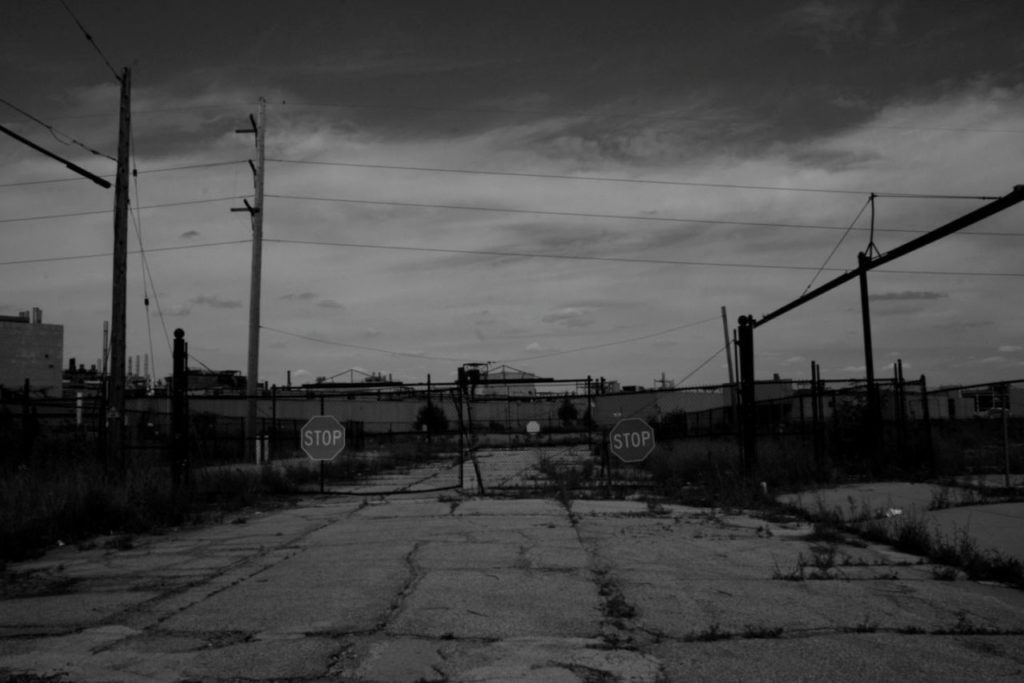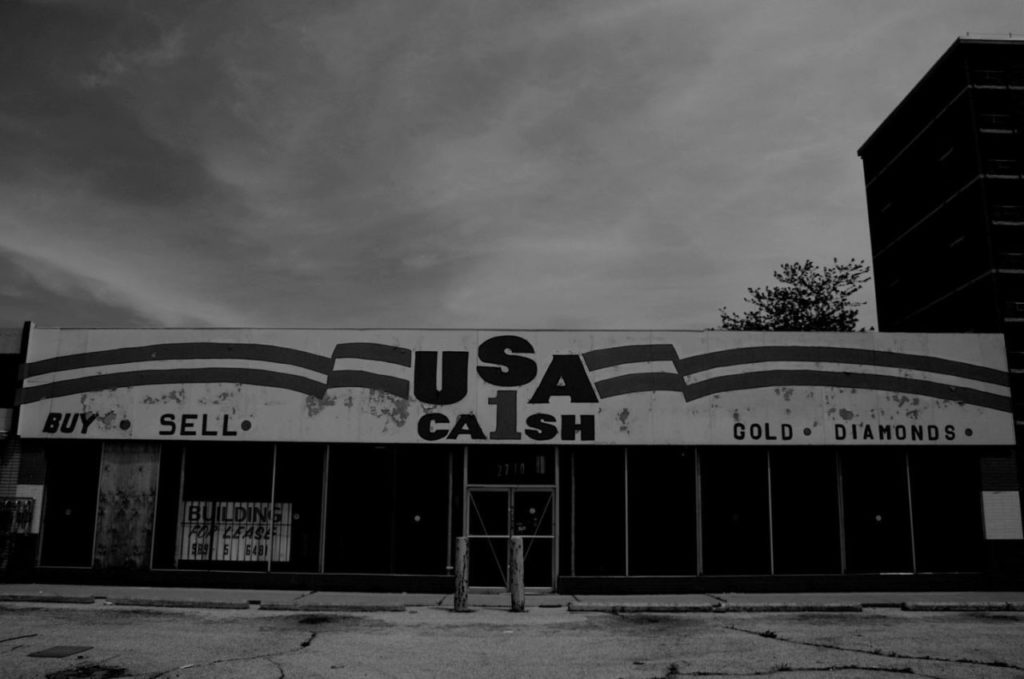Interview // Other Futures Are Possible: A Conversation with Gina Myers
by Alex Gallo-Brown | Contributing Writer

“Each year I fight,” Gina Myers writes in her new book, Some of the Times (Barrelhouse), “& each year / the things that hold / me back feel stronger.” Myers, who is the author of two previous collections, Hold It Down (2013) and A Model Year (2009), perfectly captures in these new poems a certain kind of Left affect (despondency towards our systems of work, economy, policing, racial inequity, and consumption, alongside a desire to make those things better) that forms the foundation of the radical politics that have emerged in many of America’s cities over the past decade. That doesn’t mean that her poems are without optimism, however. In fact, there is something inspiring about the emotional vulnerability and political activism with which Myers views the world where she and many Americans live—a world of “crumbling brick / & shoddy graffiti,” “shards of glass / & splintered wood” scattered by garbage trucks, bounced rent checks, endlessly accruing debt, and social precarity. That engagement with the reality of how things are is, for Myers, a prerequisite for political action—and for writing effective poems. “Remember di Prima: you can have what you ask for,” she writes in “To Do,” a kind of revolutionary to-do list, “ask for / everything.”
We corresponded over email.
Alex Gallo-Brown: I remember you telling me once, back when we both lived in Atlanta, that you resist poetic “projects.” You prefer simply to make individual poems. And the poems in your new collection cover a large temporal range: the earliest is dated 2013, while some were written much more recently. Can you tell me about the process of assembling this collection?
Gina Myers: Actually, some of the work—in particular the long poem “Saginaw (a documentary)”—goes back even further, to 2009, so this book brings together poems written over nearly a decade. It’s true that when I sit down to write, I never think I’m writing a book—I’m just working on whatever it is that I am working on at the time, and not thinking about the finished product. Writing for me is a way to explore ideas, and I have only been able to keep with particular projects for short periods of time. I don’t know if that makes me undisciplined as a writer or just someone who likes to move on! [With this book] I thought the ones I selected worked well together. I think they fit together by circling similar themes.
They do! One thing I love about this new book is that, although the themes are consistent, there is quite a lot of variance in terms of form. There are short, stand-alone poems like “4.8.14″ or “In Cuba.” There’s the long poem “Philadelphia,” which covers 20 pages and was originally its own chapbook. And then there’s “Saginaw (A Documentary),” a collaboration with Jaime Torres, whose photographs primarily depict dilapidated, destroyed, or abandoned buildings in Saginaw, Michigan, where you’re both from. Can you tell me more about that piece?
Jaime and I went to middle school and high school together, and we reconnected again later when I moved back to Saginaw after having been away for about eight years. I don’t want to speak on behalf of Jaime, but I feel like we shared some similar ideas and feelings about our home city, and I was excited to create something together.
I wanted to tell the story of a failing American city while capturing the pain and trauma of what it is like to live in such a city. I think we [as a culture] have gotten better about focusing on people, but around the time that I wrote this, national publications would regularly do features on Detroit that focused solely on the decay. While Jaime’s photographs have a similar effect (documenting buildings and public spaces), I wanted the writing to focus on what was absent in the photos, the people who populate these areas, and what it is like to live among these modern-day ruins.
Overall, it’s a pretty dark piece. One thing that is missing in it is hope. And I think that is a failure on my part. My feelings about my hometown are super complicated, filled with love and hate and everything in between. And I know this is not a story unique to Saginaw—it’s the story of so many cities in the United States.

I didn’t feel like the darkness was a weakness. To me, it felt honest—less of an objective portrayal of a city and more of a truthful depiction of the speakers’ emotional relationship to their city. In that way, it “rhymes” with many other poems in the book. We see the speaker “strolling / through South Philly / tripped up over / uneven sidewalks, rolled / ankles” and “moving through / the streets / pre-fall golden / in late afternoon / sunlight / bright red / crumbling brick / & shoddy graffiti.” We also get more overt political statements about debt, rent, and police brutality. But at the core of all of these poems, there is a deeply feeling speaker, one who is sensitive to social and political injustice but also attuned to individual loneliness and human connection. I guess what I’m trying to say is that the poems seem hopeful to me in part because they exist! How do you think about hope as it relates to politics or poetry?
I think there is something fundamentally hopeful in the act of creating. This applies both to creating art and to building community. I do not place hope in politicians or our political system, but I do feel hope when I see the work that people are doing on the ground in their own communities. I think this has especially been true since the pandemic hit the United States. Though mutual aid has long existed, I feel like we are witnessing a real explosion in this type of care—people are looking at the problems they, their friends, and neighbors are experiencing, and they are coming together to help one another. Seeing people prioritize community over individualistic capitalist greed is a source of great hope and shows there are other futures possible.
You, like me, are a poet who works outside of literary academia. One of the things I sense in many of these poems is a strong desire to communicate with people who live outside of bourgeois literary milieus—with people who don’t hold master’s degrees or teach college for a living or aspire to be poets themselves. This seems to me to be rare, although perhaps decreasingly so, as the precarity of American economic life collides with previously insulated poetic institutions. How do you think about social class as it relates to poetry? Which poets, contemporary or historical, do you look to for inspiration? And are there peers from whom you draw support or solidarity?
I think that poetry, like any art, has the potential to reach anyone, whether they have studied it or not. Though I did study poetry formally and do have an MFA, my goal was always to have a job that would support my needs and that allowed me the time and energy to write outside of work. I think this has a lot to do with where and when I grew up—there was an idea, however naïve, that a college education meant you would get a decent job. As a first generation college student, I didn’t think it mattered what or where you studied—you just needed that piece of paper. So my intellectual and artistic pursuits were always something separate from my work life.
I had started writing poetry in high school where I was exposed to a lot of writing by working class poets, which showed me anyone could write poetry. And further, through my own family, I saw that anyone could enjoy poetry. My grandmother, who was central in my life until she passed when I was 10, was not college educated but had favorite poems. My dad had his favorite poems memorized and would recite them from time to time. Poetry never felt like an elevated pursuit—it just felt like part of life. In fact, I had initially been resistant to going to college at all. I knew it was expected of me, so I applied to one school and was accepted, but the week before classes started, I decided to drop out. I wound up at community college for two years before transferring to a state school.
I think you are totally correct about how precarity has entered previously insulated institutions, like universities which over the past decade or longer have increasingly relied on adjunct labor. This, combined with an expanded administrative class and the shuttering of a number of colleges, has turned these intellectual workers into members of an exploited class, as the dream of tenure and security inside the ivory tower has disappeared for many.
I think many of my favorite writers existed either outside of or at the fringes of academia—from Lorine Niedecker and Ted Berrigan to Bernadette Mayer and the recently deceased Diane di Prima. I draw a lot of inspiration especially from di Prima’s work, from her Revolutionary Letters to her memoir Recollections of My Life as a Woman. I find her complete dedication to being a poet, living her life her own way, and her desire to forge a better future for everyone, to be extremely inspiring.
In Philadelphia, I feel very lucky to be around a number of active literary communities that are not connected to universities—there are a couple of leftist poetry presses based here, Recenter Press and Radiator Press, and an anticapitalist poetry journal, Prolit. The volunteer run anarchist bookstore The Wooden Shoe has been super important to me here, from their amazing collection of books, zines, and records, to the myriad events they host. Philly poets like Ryan Eckes, Emma Brown Sanders, Marion Bell, and Kirwyn Sutherland are doing incredible work. I don’t really personally know Marion, but she wrote one of my favorite books in recent years, Austerity. Kirwyn is someone who is completely dedicated to his craft and pushing himself as a writer—it’s like every time I see or hear something new from him he has somehow become even better as a writer than he was before. His book Jump Ship is necessary reading. Emma is similar in the pursuit of growth—they are constantly reading and reading widely, which they draw on to grow in their own writing. Their book A Fallow Channel is really incredible. And all of Ryan’s books have been important to me, but especially his most recent, General Motors. I honestly could keep listing local poets and writers who I draw a ton of inspiration from. I feel like this city is a place where people really push each other and demand a lot—a place where I have learned so much about being a poet and a person.
—
Gina Myers‘s newest book, Some of the Times, was published by Barrelhouse in October 2020. She is the author of two other full-length poetry collections, A Model Year (2009) and Hold It Down (2013), as well as several chapbooks. Originally from Saginaw, MI, she now lives in Philadelphia, PA, where she co-edits the tiny with Emma Brown Sanders. Learn more at gina-myers.org.
Alex Gallo-Brown is a poet, essayist, and labor organizer in Seattle. He is the author of Variations of Labor (2019), a collection of poems and stories.
